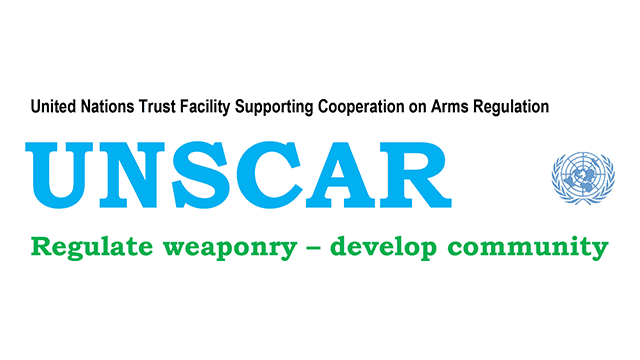The Challenge: Small and Light Weapons (SALW), a Threat to Peace, Security and Stability
The widespread misuse of small arms and light weapons (SALW) has resulted in an extensive range of negative humanitarian and socio-economic consequences including loss of life and grievous injuries, while also contributing to the commission of genocide, war crimes and crimes against humanity. The illicit trade in SALW is fueled in significant part by inadequate regulation of SALW, a lack of proper implementation of legislation, and/or inadequate enforcement of existing regulations and legislation. These factors, either individually or in combination, contribute to a serious threat to peace, security, stability and sustainable development in many regions of the world.
To address this serious challenge, the international community has adopted a number of treaties and politically binding instruments, including the UN Firearms Protocol, the UN Program of Action to Prevent, Combat and Eradicate the Illicit Trade in Small Arms and Light Weapons (PoA), the International Tracing Instrument (ITI) and, most recently, the Arms Trade Treaty (ATT).
Despite the progress made to-date, major challenges remain. One such challenge is the inadequate availability of reliable or detailed information on the scale and sources of illicit flows or holdings of small arms, which makes it difficult to assess the precise impact of illicit SALW in a quantifiable way. Secondly, there are notable policy challenges, as implementation and enforcement capacities vary greatly by region and country, making it more complex to generate solutions.
A number of challenges are common across regions and therefore ways forward can be devised through more all-encompassing approaches. These include:
- The issue of inadequate capacity in national institutions such as police prosecution offices and customs.
- The challenge of conveying alternative livelihoods to young men for whom firearms use serves as an accessible means for status and income generation.
- The need for comprehensive National Action Plans on SALW with clear benchmarks and achievable goals.
- The need for increased resource commitment to combat arms trafficking.
- The need for strengthened border control measures in many affected regions.
- The poor coordination of international cooperation and assistance.
- The insufficient involvement of civil society and women decision-makers in efforts responding to the consequences of the illicit trade in SALW.
The COVID-19 pandemic has served to exasperate existing inequalities and insecurities globally, resulting in immediate and long-term consequences in conflict-affected regions, and for residing populations. Though much remains uncertain, it has become apparent that the pandemic will result in colossal damage in fragile states, spur unrest and severely challenge international crisis management systems. The humanitarian toll of the proliferation of SALW and the illicit arms trade on fragile populations will be further intensified as citizens grapple with the impact of COVID-19, and governments move to mitigate its spread. As already-weak and resource-poor public health infrastructures in fragile states continue to be become severely challenged and overwhelmed by the demands generated by the COVID-19 crisis, the capacity to manage and respond to other domestic peace and security challenges, including the immense challenge of the illicit trade in SALW, will become greatly limited. This poses significant risk of rogue non-state actors exploiting enhanced vulnerabilities on insufficient SALW stockpile management and security, furthering the illicit trade and the humanitarian consequences.
Furthermore, other notable consequences that have arisen, and will continue to arise as a result of this public health crisis, include authoritarian governments utilizing the situation as a means of power grabbing and stifling opposition, and potentially relying upon far-reaching tools to exercise control over citizen populations. The potential use of weaponized artificial intelligence in this instance under the guise of responding to increased citizen vulnerability, has also been posed by experts on humanitarian disarmament and the arms trade.
Given the continued and enhanced threat posed by the proliferation, transportation and use of illicit SALW, as a direct consequence of the COVID-19 pandemic and its impact in fragile contexts, PGA attaches great importance to continuing and advancing its campaign work in this critical area of international peace and security. More broadly, it should be noted, the impact of national and international disasters, including pandemics, serves to inform PGA’s International Peace and Security Program’s work in this area at all times.
The Response: The SALW/ATT Campaign
PGA's Campaign to Address the Illicit Trade in Small Arms and Light Weapons and promote Adoption, Universality and Implementation of the ATT was launched in 2006 in Dakar, Senegal. PGA organized successive activities in Tbilisi, Georgia and Manila, Philippines. The PGA membership subsequently attended and several actively participated in a number of the Preparatory Committee sessions leading up to the adoption of the ATT in 2013. PGA also spearheaded the signature of the Global Parliamentary Declaration in support of the adoption of the ATT by over 2,000 MPs from 110 countries worldwide in 2012 and 2013.
This campaign is grounded in recognition of the clear linkages between SALW regulation, peace and security, and the 2030 Agenda for Sustainable Development, particularly as it pertains to SDG 16, which seeks to “promote peaceful and inclusive societies for sustainable development.” More specifically, Target 16.4 and Indicator 16.4.2, which address the reduction of arms flow and the tracing or establishment of arms’ illicit origins respectively, are of central relevance to the work of this campaign. SDG 11, which speaks to the matter of safe and resilient cities and societies, also informs the campaign in part.
Additionally, this campaign seeks to fulfill and is in line with key objectives and provisions outlined by The Secretary-General's Agenda for Disarmament, within the scope of the “Disarmament that Saves Lives” pillar of the Agenda. In this respect, the Secretary-General calls on States to support efforts to ‘mitigate the humanitarian impact of conventional arms’ and ‘address the excessive cumulation and illicit trade in small arms.’ This latter objective is of high relevance, as it calls on States to “build understanding on the impact of arms on conflict management”, “secure excessive and poorly maintained stockpiles”, and ‘promote regional dialogue to build confidence on military matters’, as outlined in Actions 21, 22 and 23 respectively; objectives which centrally inform the organization and execution of the work of this campaign.
To achieve its goal, the campaign mobilizes PGA and non-PGA Members of Parliament (MPs) worldwide with a demonstrated track record of success in promoting signature and ratification of international treaties to engage in promoting:
- National level: improved domestic firearms legislation.
- Regional level: ratification of/ accession to regional conventions and protocols addressing the illicit trade in SALW, in particular:
- The ECOWAS Convention on Small Arms and Light Weapons, Their Ammunition and Other Related Materials (ECOWAS SALW Convention).
- The Central African Convention for the Control of Small Arms and Light Weapons, their Ammunition and all Parts and Components that can be used for their Manufacture, Repair and Assembly (Kinshasa Convention).
- The Nairobi Protocol for the Prevention, Control and Reduction of SALW in the Great Lakes Region and the Horn of Africa (Nairobi Protocol).
- International level:
- Ratification of/ accession to and implementation Arms Trade Treaty (ATT).
- Compliance with the UN Firearms Protocol, the UN Program of Action to Prevent, Combat and Eradicate the Illicit Trade in Small Arms and Light Weapons (PoA), the International Tracing Instrument (ITI).
PGA attaches high priority to the incorporation of gender considerations into the activities and outputs of its campaigns. As such, PGA makes concerted efforts to ensure 50% of MPs targeted by this campaign are female Parliamentarians. Additionally, pre-designated portions of all national and international PGA workshops and field missions, are focused on improving participants’ understanding of crucial intersections between gender considerations and the UN Women, Peace and Security (WPS) Agenda and theIllicit Trade in SALW and ATT Promotion. In this respect, addressing the nexus between UNSCR 1325 (2000), UNSCR 2493 (2019), other related WPS UNSCRs and UN General Assembly Resolutions, and the proliferation, trade and use of illicit SALW, is of high importance to this campaign.
Furthermore, through national and regional workshops and field missions, and post-meeting follow-up and technical support, PGA seeks to sensitive parliamentarians to the gender-specific impacts of the illicit trade in SALW; support capacity building in the area of gender-sensitive small arms control development and implementation; illustrate the importance and means of mainstreaming gender dimensions into UN Program of Action (PoA) implementation; and demonstrate the value of and create a forum for exchanging national experiences, lessons learned and best practices on the mainstreaming of gender dimensions into policies and programmes.
Campaign Achievements
How We Work
Supported by an expert Secretariat, PGA members work together to educate, sensitize, build technical capacity, and strengthen the political will of parliamentarians to achieve campaign objectives through concrete legislative and policy initiatives. PGA works with individual parliamentarians in their national contexts through country-specific strategies, leveraging that capacity with international networking to facilitate connections among parliamentarians and build bridges with civil society, domestic and international policy-makers, and other stakeholders.



